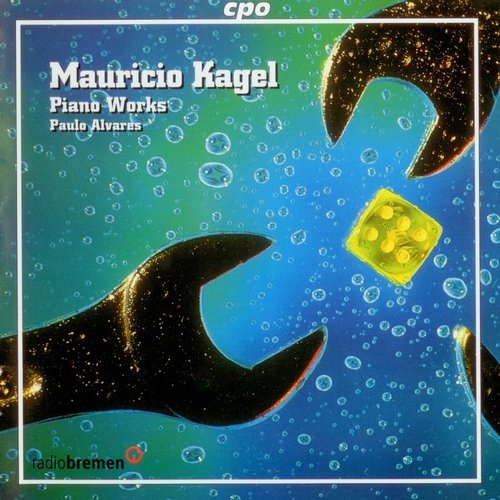
Paulo Alvares - Mauricio Kagel: Piano Works (2003)
BAND/ARTIST: Paulo Alvares
- Title: Mauricio Kagel: Piano Works
- Year Of Release: 2003
- Label: CPO
- Genre: Classical
- Quality: APE (image+.cue,log,scans)
- Total Time: 01:51:51
- Total Size: 388 Mb
- WebSite: Album Preview
Tracklist:
CD 1:
1.1 Metapiece (1961) - Version I 17:16
1.2 MM 51 (1967) - Ein Stück Filmmusik Für Klavier 8:37
1.3 Metapiece (1961) - Version II 13:12
1.4 An Tasten (1977) - Klavieretüde 15:42
CD 2:
2.1 Der Eid Des Hippokrates (1984) - Für Klavier Zu 3 Händen 2:35
2.2 Metapiece (1961) - Version III 15:25
2.3 Passé Composé (1992/93) - KlavieRhapsodie 21:33
2.4 À Deux Mains (1995) - Impromptu Für Klavier 6:20
2.5 Metapiece (1961) - Version IV 5:07
2.6 Ragtime (1994) - Version Für Klavier Und Schlagzeug 4:33
Percussion, Harmonica - Christian Dierstein
Performers:
Paulo Alvares, Piano, Voice
CD 1:
1.1 Metapiece (1961) - Version I 17:16
1.2 MM 51 (1967) - Ein Stück Filmmusik Für Klavier 8:37
1.3 Metapiece (1961) - Version II 13:12
1.4 An Tasten (1977) - Klavieretüde 15:42
CD 2:
2.1 Der Eid Des Hippokrates (1984) - Für Klavier Zu 3 Händen 2:35
2.2 Metapiece (1961) - Version III 15:25
2.3 Passé Composé (1992/93) - KlavieRhapsodie 21:33
2.4 À Deux Mains (1995) - Impromptu Für Klavier 6:20
2.5 Metapiece (1961) - Version IV 5:07
2.6 Ragtime (1994) - Version Für Klavier Und Schlagzeug 4:33
Percussion, Harmonica - Christian Dierstein
Performers:
Paulo Alvares, Piano, Voice
Whether for its historical associations or its sonic possibilities, the piano has featured prominently at all stages of Maurizio Kagel’s career. This collection gathers together most of his piano compositions: as so often with Kagel, the medium in itself does not constitute a generic body of work so much as music for one particular ‘sound source’ out of many.
As much a context for performance – of works either by Kagel or others – as a self-sufficient piece in itself, Metapièce (1961) is heard here in four realisations. The stark dynamics of ‘Version I’ contrast with the assaultive gestures of ‘Version II’; and the extremes of activity and stasis in ‘Version III’ with the kaleidoscopic textures of the brief ‘Version IV’ – the even-numbered pair with the addition of overdubs to expand the range of pianistic responses.
Of the other works, MM 51 (1976) examines the relationship between piano, maniacally vocalising pianist and ‘death-watch’ metronome from the perspective of Expressionist clichés, with a deadpan humour typical of Kagel. Der Eid des Hippokrates (1984) improbably but engagingly brings the medical oath to bear on three-hand piano, while A Deux Mains (1995) is an impromptu of finely-calculated elegance.
Two lengthier pieces further attest to the instrument’s purely musical possibilities as Kagel hears it. The etude Am Tasten (1977) pursues an intensifying course through mainly triadic chords, the resulting chant-like sequences curiously anticipating thesound world of much recent Russian music. Passé Composé (1993) is a rhapsody in which likely allusions to earlier music are but one level of a dialogue with the past, made manifest by a pre-recorded ‘afterlife’ when the pianist has ceased playing. Complex and ambiguous music, whereas Ragtime (1994) – arranged from the salon-orchestra epic Stücke der Windrose – is entertainment pure and (almost) simple.
Persuasive performances from Paulo Alvares, who must have studied this music intensively and in the context of Kagel’s output as a whole. Clear if slightly hard sound, and useful notes from the composer. Not the best place to start your Kagel exploration (try the Aeon disc listed above, or the Gramophone Award-nominated release of the Piano Trio on Winter & Winter (3/03)), but an enterprising and absorbing collection, none the less.
As much a context for performance – of works either by Kagel or others – as a self-sufficient piece in itself, Metapièce (1961) is heard here in four realisations. The stark dynamics of ‘Version I’ contrast with the assaultive gestures of ‘Version II’; and the extremes of activity and stasis in ‘Version III’ with the kaleidoscopic textures of the brief ‘Version IV’ – the even-numbered pair with the addition of overdubs to expand the range of pianistic responses.
Of the other works, MM 51 (1976) examines the relationship between piano, maniacally vocalising pianist and ‘death-watch’ metronome from the perspective of Expressionist clichés, with a deadpan humour typical of Kagel. Der Eid des Hippokrates (1984) improbably but engagingly brings the medical oath to bear on three-hand piano, while A Deux Mains (1995) is an impromptu of finely-calculated elegance.
Two lengthier pieces further attest to the instrument’s purely musical possibilities as Kagel hears it. The etude Am Tasten (1977) pursues an intensifying course through mainly triadic chords, the resulting chant-like sequences curiously anticipating thesound world of much recent Russian music. Passé Composé (1993) is a rhapsody in which likely allusions to earlier music are but one level of a dialogue with the past, made manifest by a pre-recorded ‘afterlife’ when the pianist has ceased playing. Complex and ambiguous music, whereas Ragtime (1994) – arranged from the salon-orchestra epic Stücke der Windrose – is entertainment pure and (almost) simple.
Persuasive performances from Paulo Alvares, who must have studied this music intensively and in the context of Kagel’s output as a whole. Clear if slightly hard sound, and useful notes from the composer. Not the best place to start your Kagel exploration (try the Aeon disc listed above, or the Gramophone Award-nominated release of the Piano Trio on Winter & Winter (3/03)), but an enterprising and absorbing collection, none the less.
Classical | FLAC / APE | CD-Rip
As a ISRA.CLOUD's PREMIUM member you will have the following benefits:
- Unlimited high speed downloads
- Download directly without waiting time
- Unlimited parallel downloads
- Support for download accelerators
- No advertising
- Resume broken downloads


